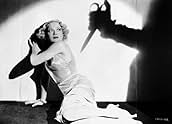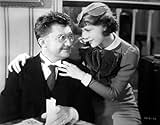Adicionar um enredo no seu idiomaA doctor who is also a "mentalist" confesses to a murder. The only problem is that the murder he's confessed to hasn't happened yet--although dead bodies are now starting to turn up all over... Ler tudoA doctor who is also a "mentalist" confesses to a murder. The only problem is that the murder he's confessed to hasn't happened yet--although dead bodies are now starting to turn up all over the place. A reporter sets out to solve the "mystery".A doctor who is also a "mentalist" confesses to a murder. The only problem is that the murder he's confessed to hasn't happened yet--although dead bodies are now starting to turn up all over the place. A reporter sets out to solve the "mystery".
Fotos
- Detective
- (não creditado)
- Bridge Player
- (não creditado)
- Police Recorder
- (não creditado)
- Announcer
- (não creditado)
- Bridge Player
- (não creditado)
- Hungry Police Guard
- (não creditado)
- Police Desk Sergeant
- (não creditado)
- Direção
- Roteiristas
- Elenco e equipe completos
- Produção, bilheteria e muito mais no IMDbPro
Enredo
Você sabia?
- CuriosidadesToward the end of the film, the story is interrupted by the appearance of an announcer (played by Arthur Hohl) who states that mysteries move too swiftly for the audience to determine the villain, and for this reason a one minute intermission will be provided for them to solve the mystery on their own before returning to the story.
- Citações
Announcer: [the movie pauses and the announcer makes the following statement after which a clock appears on the screen and the numbers 1 to 60 are superimposed on the faces of the suspects] Ladies and gentlemen, the great trouble with murder stories on the screen is that the audience has no time to solve the mystery. When reading a book, it is possible to put it down at any time to think; in a play, there are intervals between the acts. But a film moves so fast that the audience doesn't have a chance to play detective. Sitting there in your seats, you have witnessed two murders. You have seen exactly how they were done and who were present. All the clues known to the police are known to you. We are trying a little experiment: we are going to give you one minute by that clock, in which to guess who murdered Philip Ames and Mrs Brandt.
Brandt confesses all of this because he is a moral man, is horrified by his own thoughts, and wants to be stopped before it is too late. How did things get this far? Because the moral Brandt is married to a very immoral woman, and she's been suggesting that she will leave Brandt unless their financial situation improves. The police say they can't arrest him for what he hasn't done but they will come to his house and make sure he doesn't carry out his plan. Brandt is thankful and relieved.
In spite of all of these precautions, Brandt does wind up - seemingly alone - in a room with his wife and a hypnotized Ames. The lights go out. Brandt's treacherous wife screams, hears a scuffle, then wrestles with someone in the dark, then flees into the street looking for help. The person who comes to her aid is crime beat reporter Dan McKee (Stuart Erwin). When the lights come back on Ames is dead in the manner described by Brandt in his plot, the money is gone, and Brandt lies next to Ames unconscious from chloroform.
McKee wants to bust this crime wide open for his paper, but he has to work around the police and deal with the fact that there are so many suspects - Brandt's daughter, Brandt's wife and her lover for obvious reasons, Brandt himself, the police who knew Brandt's plans, maybe even Brandt's servants - had they been snooping on private conversations?. Then there is some mystery man who shadows Brandt from the beginning of the film up to the time of the murder. Could he have done it? Brandt's daughter seems innocent enough, but she could have gotten into the house any time, plus McKee is sweet on her. Could she be the killer? What is unique and rather William Castle-like about this film is that about 15 minutes before the end the film is stopped and an announcer comes out and says that this film is moving so fast that the viewer doesn't have time to figure out who did it, so a brief intermission is declared as all of the suspects are shown on the screen while the intermission clock counts down. Then the film concludes.
I really liked this one. Although you are led to believe Jean Hersholt is going to be the lead in the beginning, it is actually Stu Erwin's picture most of the way, and he rises above his normal corn-fed supporting man image and comes across true as the hard-working crime beat reporter confident he can get the killer, get the story, and get the girl, even though it might be the girl herself or her father that he winds up sending to the electric chair.
- AlsExGal
- 20 de mai. de 2011
- Link permanente
Principais escolhas
Detalhes
- Data de lançamento
- País de origem
- Idioma
- Também conhecido como
- The Crime of the Century
- Locações de filme
- Empresa de produção
- Consulte mais créditos da empresa na IMDbPro
- Tempo de duração1 hora 13 minutos
- Cor
- Proporção
- 1.37 : 1
Contribua para esta página
































